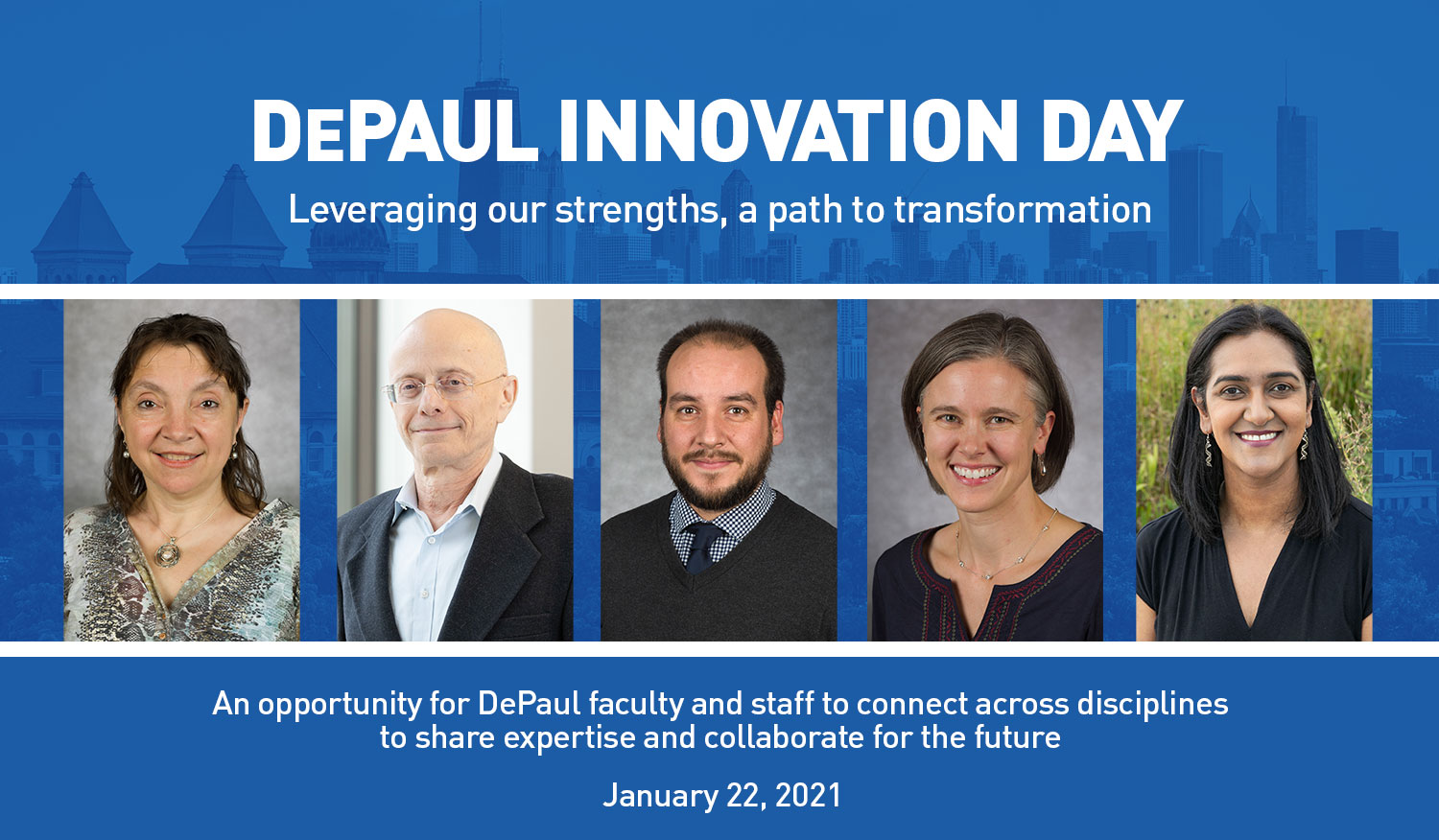 DePaul's second annual innovation day featured presenters from disciplines across the university, including (from left) Daniela Raicu, associate provost for research; Leonard Jason, professor of psychology; Fernando De Maio, professor of sociology; Hilary Conklin, professor of education; and Bala Chaudhary, assistant professor of environmental science and studies. (DePaul University/Jeff Carrion)
DePaul's second annual innovation day featured presenters from disciplines across the university, including (from left) Daniela Raicu, associate provost for research; Leonard Jason, professor of psychology; Fernando De Maio, professor of sociology; Hilary Conklin, professor of education; and Bala Chaudhary, assistant professor of environmental science and studies. (DePaul University/Jeff Carrion)A building has collapsed, and first responders arrive on the scene. They need to get inside fast to rescue anyone who is trapped, but first they need to determine if it's safe to enter. What if a robot, shaped like a snake, could slither through small crevices to assess the situation? DePaul's Robotics and Medical Engineering Lab is helping make this technology a reality.
Snake robots were one of many topics covered at DePaul's second annual Innovation Day. This year's virtual event, held on Jan. 22, brought faculty and staff from across the university together with one primary objective: turn ideas into projects.
In addition to presenting research, participants shared advice on how to get projects off the ground with support from DePaul's internal grant programs.
“Have a clear project in mind," said Hilary Conklin, professor in the College of Education, who presented on empathic listening. “Be able to communicate your ideas to audiences beyond your own sphere."
Take, snake robots, for example.
“The idea posed is if we can have snake-like robots, we can use those in a disaster response situation. We can go into these places pretty fast and help first responders do their job," said Isuru Godage, assistant professor in the College of Computing and Digital Media and director of the Robotics and Medical Engineering, or RoME, lab.
Godage explained snake robot research is not new, but thus far, prototypes use rigid units and therefore don't have enough bendability. As a result, there is a limited ability to realize the full potential of snake-inspired robots. With funding provided by the University Research Council, Godage and a doctoral graduate student are trying to determine how to best make soft snake robots achieve locomotion. In other words, how to slither.
“Soft robots, because of their continuous bending, have strong potential to unlock the mysteries of snake locomotion. We achieved a serpentine gait, but it doesn't advance due to uniform friction of the rubber skin we used. But we are now working on testing it in water where we do not have this friction problem," Godage said. “A rolling gait does advance, a first in the field of soft robotic snakes, and funding from DePaul helped us achieve these results."
Throughout the presentations, it was hard to ignore Innovation Day was taking place after almost one year of remote learning and work. Presenters noted while COVID-19 has delayed projects, unexpected opportunities also have emerged. For example, the virtual reality classroom.
With support from the Academic Growth and Innovation Fund, known as AGIF, Bree McEwan purchased virtual reality headsets to convert a freshman Discover Chicago class to a remote environment in response to COVID-19.
“For this class, we were taking the idea: can you do the things you would normally do in a classroom and then do them in virtual reality," said McEwan, an associate professor of communication studies in the College of Communication and co-director of DePaul's Virtual and Augmented Reality Communication Lab.
Students enrolled in McEwan's Discover Chicago class each received their own VR headset. Inside the virtual classroom, students participated in group interactions, met with guest speakers and even had the opportunity to provide feedback to the headset product designers—not to mention learn about VR career opportunities.
Shifting gears to the arts, Kristina Fluty shared plans to develop a theatrical intimacy certificate program. An assistant professor of movement in The Theatre School, Fluty explained intimacy direction and coordination is a relatively new field that trains professionals to oversee scenes involving nudity, sexual violence or intimate relationships, such as a parent pulling a child onto their lap. Logistically, it's the job of the intimacy director to make sure these scenes look real and, more importantly, are safe for the actors.
“These professionals are becoming more and more valuable as we see how they change the rooms they are in," Fluty said. “Their primary objective is to make sure the actors are not harmed. They provide this bridge between the actor and the director."
While a handful of companies exist around the world to train intimacy directors and coordinators, the courses are expensive. Currently, no certificate programs exist at the university level. Fluty secured an AGIF grant with the hope of making DePaul the first university to offer an intimacy training certificate.
“Often underrepresented communities are not able to access this training, and we think DePaul can help," Fluty said. “We want to be a leader in this field, and we want to do it right."
To continue the synergy inspired by Innovation Day, the Office of Research Services will host monthly lunch and learn sessions, starting with “Innovation through AGIF" on March 5.
“Today has been a great day to come together as a group to celebrate innovation at DePaul," said Daniela Raicu, associate provost for research. “Although we are in a virtual environment, I could still feel the energy in the room, the passion for what we do to make DePaul a better place, and the synergies and potential for collaborations that will follow after this date."
DePaul's third annual Innovation Day will take place on Jan. 28, 2022.
Recordings of all the 2021 presentations and panel discussions are available on the Innovation Day website and the links below:
Welcome and AGIF Presentations
University Research Council Presentations
Leveraging Partnerships Panel
Perspectives on the Teacher- Scholar Model Panel